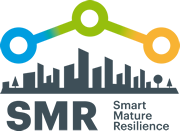Resources
PUBLICATIONS AND DOWNLOADS
Delphi Analysis Report
Date
Deliverable
30/06/2016
D1.4
Lead Partner
TECNUN, University of Navarra
Authors
Maider Sainz (Tecnun), Josune Hernantes (Tecnun), Leire Labaka (Tecnun) Patricia Maraña (Tecnun) Iker Zubizarreta (Tecnun) and Jose Mari Sarriegi (Tecnun)
Reviewed by
Susan Howick, Colin Eden, Igor Pyrko, Amy Rankin, Vasileios Latinos, René Lindner, Magnus Bång
Increasing resilience to crises and disasters is a topic of highest political concern worldwide. Cities and communities need methods and tools to prevent and manage the effects of natural hazards such as floods, storms, earthquakes, volcanoes and tsunamis as well as man-made threats such as accidents and terrorism. The aim of the Smart Mature Resilience project is to deliver a Resilience Management Guideline to support city decision-makers in developing and implementing resilience measures in their cities in order for the cities to form an emerging resilience backbone for Europe. The overall objective of WP1 is to obtain an overview of current practice in urban resilience and EU sectorial resilience approaches, to identify, synthesize and assess the main challenges and best practice of today.
This report is the result of the work carried out in the fourth task in WP1 of SMR. The findings of the previous three tasks have been processed by a Delphi method process involving experts, including selected participants from relevant EU FP7 projects.
The general outcome of this report is an expert assessment of resilience implementation approaches and elements that can be adapted to relevant critical infrastructures and the role of the population, rescuers and the media with a view to derive a resilience maturity model (WP2). The resilience maturity model will be further refined in WP3. An early version of a general maturity model is an output of this task, and serves and a vehicle for transfer of outcome together with workshops in WP2. Delphi is a systematic and iterative process for structuring a group communication process in order to obtain a consensus about a complex problem. The Delphi method consists of multiple rounds of questionnaires providing feedback among informants.

This project has received funding from the European Union’s Horizon 2020 research and innovation programme under grant agreement no. 653569.

